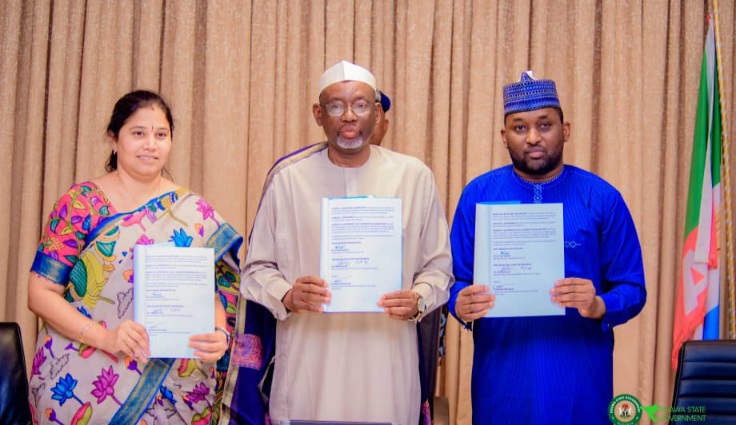Jigawa signs MoU with Agrighar India on agribusiness development
Governor Umar Namadi of Jigawa State has commended the results of the Agrighar Scoping Study carried out across ten local government areas, which led to the signing of a Memorandum of Understanding (MoU) with the agribusiness company.
Speaking during a meeting with the Agrighar India delegation led by Sowmini Sunkara on Saturday, Namadi praised the team for the depth and thoroughness of the two-week study.
“This study is a true reflection of our vision, and the dedication shown by your team has given us confidence that you are a partner in progress.
“By 2030, Jigawa will be recognised not only in Nigeria but globally for the quality of our agricultural products.
“We are ready to work with you and start implementing this transformative project without delay. I want to assure you that this relationship is already established, and we are prepared to take the next steps.
“The way you interacted with our people showed that they are ready to collaborate. Their enthusiasm assures me that we are on the right path,” Governor Namadi stated.
The Agrighar team visited key regions and value chains including rice, groundnut, cassava, hibiscus, dairy, as well as fisheries and engaged with local stakeholders to understand their needs.
Read also: 2027: Namadi, APC leaders receive over 66,000 defectors in Jigawa
The team lead, Sunkara on her part, highlighted that the goal is to create sustainable livelihoods and position Jigawa as a model state for inclusive agribusiness development in Nigeria. “Our interactions during the field visits demonstrated the eagerness of local farmers and stakeholders to engage and innovate”.
Key initiatives from the Agrighar Scoping Study include, establishing agribusiness incubation clusters in vital LGAs to nurture youth and women entrepreneurs and reviving non-functional processing centres in Jahun, Gidanara, and Kila Ward through Public-Private Partnership (PPP) models.
Others are linking Jigawa producers to Kano markets for sesame, hibiscus, rice, dairy, and fish, introducing solar-powered processing systems and modern packaging solutions to improve competitiveness, strengthening cooperative governance, branding, and value addition to enhance rural incomes.

